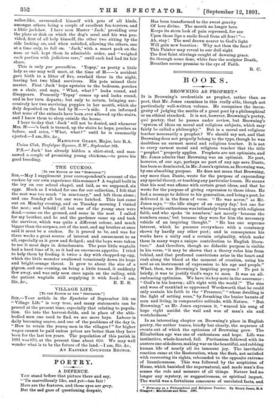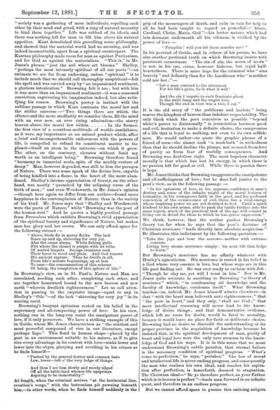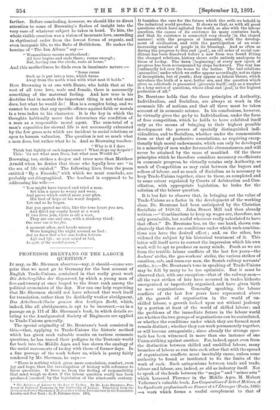BOOKS.
BROWNING AS PROPHET.*
IT is Browning's credentials as prophet, rather than. as poet, that Mr. Jones examines in this really able, though not particularly well-written volume. He recognises the incon- gruity of judging the merits of a great poet by a philosophical or an ethical standard. It is not, however, Browning's poetry, quit poetry, that he passes under review, but Browning's "system of ideas on moral and religious subjects, which may- fairly be called a philosophy." But is a moral and religious teacher necessarily a prophet P We should say not, and that Browning does not properly belong to the type, though he was doubtless an earnest moral and religious teacher. It is not to every earnest moral and religions teacher that the title " prophet" properly applies. Prophets are not optimists, and Mr. Jones admits that Browning was an optimist. No poet, however, of our age, perhaps no poet of any age save Dante, has been so dominated, in Mr. Jones's opinion, as Browning was,. by one absorbing purpose. He does not mean that Browning,. any more than Dante, wrote for the purpose of expounding any special theory, or teaching any particular lesson. He means that his soul was aflame with certain great ideas, and that he wrote for the purpose of giving expression to those ideas. He had a message to deliver to his generation, and being a poet, he delivered it in the form of verse. " He was never," as Mr. Jones says, " the idle singer of an empty day,' but one for whom poetic enthusiasm was intimately bound up with religions faith, and who spoke 'in numbers,' not merely because the numbers came,' but because they were for him the necessary vehicle of an inspiring thought." " He has one supreme interest, which he pursues everywhere with a constancy shown by hardly any other poet ; and in consequence his works have a unity and a certain originality, which make them in many ways a unique contribution to English litera- ture." And therefore, though no didactic purpose is visible in his verse, "it may be shown that a theory rules him from. behind, and that profound convictions arise in the heart and rush along the blood at the moment of creation, using his soul as an instrument of expression to his age and people." What, then, was Browning's inspiring purpose ? To put it briefly, it was to justify God's ways to man. It was an all- embracing optimism. We have its key-note in the assurance " God's in his heaven ; all's right with the world!!" The sins and woes of mankind so oppressed Wordsworth that he could only sustain his faith in the "Presence," "whose dwelling is the light of setting suns," by forsaking the busier haunts of men and living, in comparative solitude, with Nature. " But Browning," as Mr. Jones expresses it, "weaved his song of hope right amidst the wail and woe of man's sin and. wretchedness."
In an interesting chapter on Browning's place in English poetry, the author traces, briefly but clearly, the sequence of events out of which the optimism of Browning grew. The Elizabethan age was one of enthusiasm and hope. Life was. instinctive, whole-hearted, full. Puritanism followed with its, austere one-sidedness, makin g war on the beautiful, and robbing human life of nearly all its innocent joy. The inevitable reaction came at the Restoration, when the flesh, not satisfied with recovering its rights, rebounded to the opposite extreme- of licentiousness. This was followed by the scepticism of. Hume, which banished the supernatural, and made man's five- senses the rule and measure of all things. Nature had no. longer any mystery, or suggestiveness, or spiritual import. The world was a fortuitous concourse of unrelated facts, and
• Browsing as a Philosophical and Religious Teacher. By Henry Jones, Glasgow : blackthorn and Sons. 1891.
" society was a gathering of mere individuals, repelling each other by their need and greed, with a ring of natural necessity to bind them together." Life was robbed of its ideals, and there was nothing left for man to lift him above his natural appetites. Kant demolished this grovelling sense-philosophy, and showed that the material world had no meaning, and was indeed inconceivable, apart from a spiritual counterpart. The
Kantian philosophy made room for man as against Puritanism, and for God as against the materialists. " This is," in Mr. Jones's phrase,'"just the soil where art blooms." Shelley, "perhaps the most intensely spiritual of all our poets "—an estimate we are far from endorsing, unless " spiritual " is to include much that we should call thoroughly nnspiritual—felt the spell and was carried away by" an impassioned sentiment, a glorious intoxication." Browning felt it too ; but with him it was more than an impassioned sentiment—it was a reasoned conviction, captivating his imagination indeed, but also satis- fying his reason. Browning's poetry is instinct with the sublime passage in which Kant contrasts the moral law and the stellar universe:—" Two things there are which, the oftener and the more stedfastly we consider them, fill the mind with an ever new, an ever rising admiration—the starry heaven above, the moral law within In the former, the first view of a countless multitude of worlds annihilates, as it were, my importance as an animal product which, after a brief and incomprehensible endowment with the powers of life, is compelled to refund its constituent matter to the planet—itself an atom in the universe—on which it grew. The other, on the contrary, elevates without limit my worth as an intelligent being." Browning therefore found "harmony in immortal souls, spite of the muddy vesture of decay." Man, however degraded, was still to him the paragon of Nature. There was some spark of the divine love, capable of being kindled into a flame, in the heart of the most aban- doned. Shelley's intense appreciation of beauty, on the other hand, was nearly " quenched by the eclipsing curse of the birth of man ; " and even Wordsworth, in Mr. Jones's opinion —though here again we differ from our author—found more happiness in the contemplation of Nature than in the society
of his kind. Mr. Jones says that " Shelley and Wordsworth were the poets of Nature," while "Browning was the poet of the human soul." And he quotes a highly poetical passage from Paracelsus which exhibits Browning's vivid appreciation of the spiritual beauty and significance of Nature, but makes
man her glory and her crown. We can only afford space for the following extract :— " Above, birds fly in merry flocks. The lark
Soars up and up, shivering for very joy.
Afar the ocean sleeps. White fishing gulls Flit where the strand is purple with its tribe Of nested limpets. Savage creatures seek Their loves in wood and plain. And God renews His ancient rapture. Thus he dwells in all, From life's minute beginnings, up at last To man—the consummation of this scheme Of being, the completion of this sphere of life."
In Browning's view, as in St. Paul's, Nature and Man are
correlated, needing each other, completing each other, and are together homeward bound to the new heaven and new earth "wherein dwelleth righteousness." Let us call atten- tion in passing to the exquisite image equal to any in Shelley's " Ode "—of the lark " shivering for very joy " in its soaring carol.
Browning's buoyant optimism rested on his belief in the supremacy and all-conquering power of love. In his view, nothing can in the long-run resist the omnipotent power of love, if it only persevere. We have a striking example of this in Guido, whom Mr. Jones characterises as " the subtlest and most powerful compound of vice in our literature, except perhaps Iago." This fiend in human shape—placed by the poet in an environment suitable to his nature, as if to give vice every advantage in its contest with love—sinks lower and lower into the abyss, glorying and revelling in his crimes as he finds himself- " Pushed by the general horror and common hate Low, lower—left o' the very ledge of things.
And thus I see him slowly and surely edged Off all the table-land whence life upsprings Aspiring to be immortality."
At length, when the criminal arrives " at the horizontal line, creation's verge," with the bottomless pit yawning beneath him,—in other words, when he finds himself suddenly in the
grip of the messengers of death, and calls in vain for help to all he had been taught to regard as powerful—" Abate, Cardinal, Christ, Maria, God "—his better nature, which had lain dormant underneath all his vileness, is vivified by the power of love :-
" Pompilia ! will you let them murder me ? "
In his portrait of Guido, aid in others of his poems, we have also another profound truth on which Browning insists with
persistent earnestness. " The sin of sin, the scorn of scorn" is not, in his eye, crime, however hideous, but tepid half- heartedness. There is more hope for the criminal who " sine bravely " and defiantly than for the Laodicean who " is neither cold nor hot : " —
" Let a man contend to the uttermost For his life's prize, be it what it will!
And the sin I impute to each frustrate ghost. Is the unlit lamp and the ungirt loin, Though the end in view was a vice, I say."
It is the old story of " the publicans and harlots " being nearer the kingdom of heaven than indolent respectability. The
only black which the poet conceives as possible " beyond white's power to disintensify " is irresolution between good and evil, hesitation to make a definite choice, the compromise
of a life that is loyal to nothing, not even to its own selfish- ness. He would rather—to quote the graphic phrase of a friend of ours—the sinner took " a mud-bath " in wickedness than that he should decline the plunge, not so much from love of purity as from fear of worldly consequences. And Browning was doubtless right. The most hopeless character morally is that which has lost its energy, in which there is no passion left for good or evil. While there is passion there
is hope.
Mr. Jones thinks that Browning exaggerates the omnipotence and all•sufficingness of love ; but he does full justice to the poet's view, as in the following passage :-
" In his optimism of love, in his supreme confidence in man's destiny and sense of the infinite might of the moral horizon of humanity, in his courageous faith in the good, and his profound conviction of the evanescence of evil, there lies a vital energy whose inspiring power we are yet destined to feel. Until a spirit kindred to his own arises, able to push the battle further into the same region, much of the practical task of the ago will consist in living out in detail tho ideas to which he has given expression."
We think, however, that the author pushes Browning's
theory too far when he says that the poet's doctrine of Christian nescience " leads directly into absolute scepticism." He illustrates this indictment by the following quotation :— " Take the joys and bear the sorrows—neither with extreme concern.
Living here means nescience simply : 'tis next life that helps to learn."
But Browning's nescience has no affinity whatever with Huxley's agnosticism. His nescience is rooted in his belief in a God whose very essence is love, but whose ways are in this life past finding out. He was ever ready to exclaim with Job : " Though he slay me, yet will I trust in him." Nor is Mr. Jones quite accurate in ascribing to Browning "a theory of nescience" which, " in condemning all knowledge and the faculty of knowledge, condemns itself." What Browning teaches—as, indeed, Mr. Jones himself admits elsewhere—is that " with the heart man believeth unto righteousness ; " that the pure in heart," and they only, " shall see God ;" that mere intellectual reasoning will never lead to the know- ledge of divine things ; and that demonstrative evidence, which left no room for doubt, would be fatal to morality, because it would leave no place for faith or deliberate choice. Browning had no desire to discredit the understanding or its proper province in the acquisition of knowledge because he insisted that, in the spiritual development of man, purity of heart and loyal love were the only sure avenues to the know- ledge of God and his ways. It is in this sense that we must
understand Browning's subtle paradox, that eternal failure is the necessary condition of spiritual progress. " What's come to perfection," he says, " perishes." 1 he law of moral and intellectual life is never-ending progress, and consequently
the man who realises his own ideal, and reaches his aspira- tion after perfection, is henceforth doomed to stagnation. The Christian ideal—" Be ye therefore perfect, as your Father
which is in heaven is perfect "—leads man forward in an infinite quest, and therefore in an endless progress.
But we cannot afford space to pursue this enticing subject. farther. Before concluding, however, we should like to direct attention to some of Browning's flashes of insight into the very core of whatever subject he takes in hand. To him, the whole visible creation was a vision of incarnate love, ascending in rhythmical order from the lowest forms of organic, and even inorganic life, to the Babe of Bethlehem. He makes the heroine of " The Inn Album" say :-
" Womanliness means motherhood :
All love begins and ends there ; roams enough ; But, having run the circle, rests at home."
And this motherliness he finds even in inanimate nature r- " Some cause
Such as is put into a tree, which turns
Away from the north wind with what nest it holds."
Here Browning is at one with Dante, who holds that at the root of all true love, male and female, there is necessarily something of the maternal feeling. And how true is his
.doctrine that in morals the important thing is not what man does, but what he would do ! Man is a complex being, and we cannot be sure that any specific offence against faith or morals is a true index to his character. It is the key in which the thoughts habitually move that determines the condition of a man as a responsible moral agent. The sum-total of a man's capacities for eternal life is not necessarily exhausted by the few gross acts which are incident to social relations or -open to human valuation. The question is not so much what a man does, but rather what he is. And so Browning teaches :
" Why is it I dare Think but lightly of such impuissance ? What stops my despair ? This : 'tis not what man Does, but what man Would do."
Browning, too, strikes a deeper and truer note than Matthew Arnold when he denies that those who loyally love are " in
the sea of life enisled." The following lines, from the poem entitled " By a Fireside," with which we must conclude, are probably autobiographical. The husband is supposed to be .addressing his wife :-
" You might have turned and tried a man,
Set him a space to weary and wear, And prove which suited more your plan, His best of hope or his worst despair, Yet end as he began.
But you spared me this, like the true heart you are, And filled my empty heart at a word.
If two lives join, there is oft a scar, They are one and one, with a shadowy third : One near one is too far.
A moment after, and hands unseen Were hanging the night around us fast ; But we knew that a bar was broken between Life and life : we were mixed at last, In spite of the mortal screen."




































 Previous page
Previous page